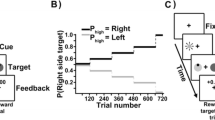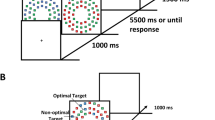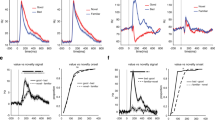Abstract
Attention can be biased towards previously reward-associated stimuli even when they are task-irrelevant and physically non-salient, although studies of reward-modulated attention have been largely limited to primate (including human and nonhuman) models. Birds have been shown to have the capacity to discriminate reward and spatial cues in a manner similar to primates, but whether reward history involuntarily affects their attention in the same way remains unclear. We adapted a spatial cueing paradigm with differential rewards to investigate how reward modulates the allocation of attention in peafowl (Pavo cristatus). The birds were required to locate and peck a target on a computer screen that was preceded by a high-value or low-value color cue that was uninformative with respect to the location of the upcoming target. All birds exhibited a validity effect (performance enhanced on valid compared to invalid cue), and an interaction effect between value and validity was evident at the group level, being particularly pronounced in the birds with the greatest amount of reward training. The time course of reward learning was conspicuously incremental, phenomenologically slower compared to primates. Our findings suggest a similar influence of reward history on attention across phylogeny despite a significant difference in neuroanatomy.





Similar content being viewed by others
Data availability
Raw data and all experiment and analysis code are available via the Open Science Framework (OSF) at https://osf.io/dvzqh/?view_only=28bcf725882548e8acb36a06adea7960.
References
Anderson BA (2019) Neurobiology of value-driven attention. Curr Opin Psychol 29:27–33. https://doi.org/10.1016/j.copsyc.2018.11.004
Anderson BA (2021) An adaptive view of attentional control. Am Psychol 76(9):1410–1422. https://doi.org/10.1037/amp0000917
Anderson BA, Kim H (2018a) Mechanisms of value-learning in the guidance of spatial attention. Cognition 178:26–36. https://doi.org/10.1016/j.cognition.2018.05.005
Anderson BA, Kim H (2018b) On the representational nature of value-driven spatial attentional biases. J Neurophysiol 120(5):2654–2658. https://doi.org/10.1152/jn.00489.2018
Anderson BA, Laurent PA, Yantis S (2011) Value-driven attentional capture. Proc Natl Acad Sci 108(25):10367–10371. https://doi.org/10.1073/pnas.1104047108
Anderson BA, Kuwabara H, Wong DF, Gean EG, Rahmim A, Brasic JR, George N, Frolov B, Courtney SM, Yantis S (2016) The role of dopamine in value-based attentional orienting. Curr Biol 26(4):550–555. https://doi.org/10.1016/j.cub.2015.12.062
Anderson BA, Kuwabara H, Wong DF, Roberts J, Rahmim A, Brasic JR, Courtney SM (2017) Linking dopaminergic reward signals to the development of attentional bias: a positron emission tomographic study. Neuroimage 157:27–33. https://doi.org/10.1016/j.neuroimage.2017.05.062
Anderson BA, Kim H, Kim AJ, Liao MR, Mrkonja L, Clement A, Grégoire L (2021) The past, present, and future of selection history. Neurosci Biobehav Rev 130:326–350. https://doi.org/10.1016/j.neubiorev.2021.09.004
Awh E, Belopolsky AV, Theeuwes J (2012) Top-down versus bottom-up attentional control: a failed theoretical dichotomy. Trends Cogn Sci 16(8):437–443. https://doi.org/10.1016/j.tics.2012.06.010
Beletsky LD, Orians GH, Wingfield JC (1990) Effects of exogenous androgen and antiandrogen on territorial and nonterritorial red-winged blackbirds (Aves: Icterinae). Ethology 85(1):58–72. https://doi.org/10.1111/j.1439-0310.1990.tb00386.x
Blough DS (1989) Contrast as seen in visual search reaction times. J Exp Anal Behav 52(3):199–211. https://doi.org/10.1901/jeab.1989.52-199
Blough DS (2000) Effects of priming, discriminability, and reinforcement on reaction-time components of pigeon visual search. J Exp Psychol Anim Behav Process 26(1):50–63. https://doi.org/10.1037/0097-7403.26.1.50
Bowmaker JK, Heath LA, Wilkie SE, Hunt DM (1997) Visual pigments and oil droplets from six classes of photoreceptor in the retinas of birds. Vis Res 37(16):2183–2194. https://doi.org/10.1016/S0042-6989(97)00026-6
Brainard DH (1997) The psychophysics toolbox. Spat vis 10(4):433–436. https://doi.org/10.1163/156856897X00357
Calvert AL, Green L, Myerson J (2011) Discounting in pigeons when the choice is between two delayed rewards: implications for species comparisons. Front Neurosci 5:96. https://doi.org/10.3389/fnins.2011.00096
Chelazzi L, Perlato A, Santandrea E, Della Libera C (2013) Rewards teach visual selective attention. Vision Res 85:58–72. https://doi.org/10.1016/j.visres.2012.12.005
Clayton NS, Emery NJ (2015) Avian models for human cognitive neuroscience: a proposal. Neuron 86(6):1330–1342. https://doi.org/10.1016/j.neuron.2015.04.024
Della Libera C, Chelazzi L (2009) Learning to attend and to ignore is a matter of gains and losses. Psychol Sci 20(6):778–784. https://doi.org/10.1111/j.1467-9280.2009.02360.x
Della Libera C, Perlato A, Chelazzi L (2011) Dissociable effects of reward on attentional learning: from passive associations to active monitoring. PLoS ONE 6(4):e19460. https://doi.org/10.1371/journal.pone.0019460
Desimone R, Duncan J (1995) Neural mechanisms of selective visual attention. Annu Rev Neurosci 18(April):193–222. https://doi.org/10.1126/science.1247003
Donohue SE, Hopf JM, Bartsch MV, Schoenfeld MA, Heinze HJ, Woldorff MG (2016) The rapid capture of attention by rewarded objects. J Cogn Neurosci 28(4):529–541. https://doi.org/10.1162/jocn_a_00917
Failing MF, Theeuwes J (2014) Exogenous visual orienting by reward. J vis 14(5):6–6. https://doi.org/10.1167/14.5.6
Folk CL, Remington R (1998) Selectivity in distraction by irrelevant featural singletons: evidence for two forms of attentional capture. J Exp Psychol Hum Percept Perform 24(3):847. https://doi.org/10.1037/0096-1523.24.3.847
Folk CL, Remington RW, Johnston JC (1992) Involuntary covert orienting is contingent on attentional control settings. J Exp Psychol Hum Percept Perform 18(4):1030–1044. https://doi.org/10.1037/0096-1523.18.4.1030
Güntürkün O (2005) The avian “prefrontal cortex” and cognition. Curr Opin Neurobiol 15(6):686–693. https://doi.org/10.1016/j.conb.2005.10.003
Güntürkün O, Koenen C, Iovine F, Garland A, Pusch R (2018) The neuroscience of perceptual categorization in pigeons: a mechanistic hypothesis. Learn Behav 46:229–241. https://doi.org/10.3758/s13420-018-0321-6
Harikrishnan S, Vasudevan K, Sivakumar K (2010) Behavior of Indian peafowl Pavo cristatus Linn. 1758 during the mating period in a natural population. Open Ornithol J 3:13–19. https://doi.org/10.2174/1874453201003010013
Hart NS (2002) Vision in the peafowl (Aves: Pavo cristatus). J Exp Biol 205(24):3925–3935. https://doi.org/10.1242/jeb.205.24.3925
Herbranson WT, Stanton GL (2011) Flexible serial response learning by pigeons (Columba livia) and humans (Homo sapiens). J Comp Psychol 125(3):328–340. https://doi.org/10.1037/a0023299
Hickey C, Chelazzi L, Theeuwes J (2011) Reward has a residual impact on target selection in visual search, but not on the suppression of distractors. Vis Cogn 19(1):117–128. https://doi.org/10.1080/13506285.2010.503946
Hickey C, Kaiser D, Peelen MV (2015) Reward guides attention to object categories in real-world scenes. J Exp Psychol Gen 144(2):264–273. https://doi.org/10.1037/a0038627
Hodos W, Potocki A, Ghim MM, Gaffney M (2003) Temporal modulation of spatial contrast vision in pigeons (Columba livia). Vision Res 43(7):761–767. https://doi.org/10.1016/S0042-6989(02)00417-0
Irons JL, Folk CL, Remington RW (2012) All set! Evidence of simultaneous attentional control settings for multiple target colors. J Exp Psychol Hum Percept Perform 38(3):758–775. https://doi.org/10.1037/a0026578
Itti L, Koch C (2001) Computational modelling of visual attention. Nat Rev Neurosci 2(3):194–203. https://doi.org/10.1038/35058500
Kirsch JA, Güntürkün O, Rose J (2008) Insight without cortex: lessons from the avian brain. Conscious Cogn 17(2):475–483. https://doi.org/10.1016/j.concog.2008.03.018
Knudsen EI (2018) Neural circuits that mediate selective attention: a comparative perspective. Trends Neurosci 41(11):789–805. https://doi.org/10.1016/j.tins.2018.06.006
Krauzlis RJ, Bogadhi AR, Herman JP, Bollimunta A (2018) Selective attention without a neocortex. Cortex 102:161–175. https://doi.org/10.1016/j.cortex.2017.08.026
Laurent PA, Hall MG, Anderson BA, Yantis S (2015) Valuable orientations capture attention. Vis Cogn 23(1–2):133–146. https://doi.org/10.1080/13506285.2014.965242
Le Pelley ME, Pearson D, Griffiths O, Beesley T (2015) When goals conflict with values: counterproductive attentional and oculomotor capture by reward-related stimuli. J Exp Psychol Gen 144(1):158. https://doi.org/10.1037/xge0000037
Liao MR, Anderson BA (2020) Reward learning biases the direction of saccades. Cognition 196:104145. https://doi.org/10.1016/j.cognition.2019.104145
Liao MR, Kim AJ, Anderson BA (2023) Neural correlates of value-driven spatial orienting. Psychophysiology. https://doi.org/10.1111/psyp.14321
Meehan CL, Mench JA (2007) The challenge of challenge: can problem solving opportunities enhance animal welfare? Appl Anim Behav Sci 102(3–4):246–261. https://doi.org/10.1016/j.applanim.2006.05.031
Millar, L. N. (2013). Improving captive animal welfare through the application of cognitive enrichment. Phd Thesis, University of Exeter.
Niu X, Jiang Z, Peng Y, Huang S, Wang Z, Shi L (2022) Visual cognition of avians and its underlying neural mechanism: a review. Avian Res 13:100023. https://doi.org/10.1016/j.avrs.2022.100023
Odum AL (2011) Delay discounting: I’m ak, you’re ak. J Exp Anal Behav 96(3):427–439. https://doi.org/10.1901/jeab.2011.96-423
Olkowicz S, Kocourek M, Lučan RK, Porteš M, Fitch WT, Herculano-Houzel S, Němec P (2016) Birds have primate-like numbers of neurons in the forebrain. Proc Natl Acad Sci 113(26):7255–7260. https://doi.org/10.1073/pnas.1517131113
Olsson P, Lind O, Kelber A (2015) Bird colour vision: behavioural thresholds reveal receptor noise. J Exp Biol 218(2):184–193. https://doi.org/10.1242/jeb.111187
Peck CJ, Jangraw DC, Suzuki M, Efem R, Gottlieb J (2009) Reward modulates attention independently of action value in posterior parietal cortex. J Neurosci 29(36):11182–11191. https://doi.org/10.1523/JNEUROSCI.1929-09.2009
Pessoa L (2009) How do emotion and motivation direct executive control? Trends Cogn Sci 13(4):160–166. https://doi.org/10.1016/j.tics.2009.01.006
Posner MI (1980) Orienting of attention. Q J Experim Psychol 32(1):3–25
Posner, M. I., Nissen, M. J., & Ogden, W. C. (1978). Attended and unattended processing modes: The role of set for spatial location. In H. L. Pick & I. J. Saltzman (Eds.), Modes of perceiving and processing information. Hillsdale, N.J.: Lawrence Erlbaum.
Petrie M, Halliday T (1994) Experimental and natural changes in the peacock's (Pavo cristatus) train can affect mating success. Behav Ecol Sociobiol 35:213–217. https://doi.org/10.1007/BF00167962
Preciado D, Munneke J, Theeuwes J (2017) Mixed signals: the effect of conflicting reward-and goal-driven biases on selective attention. Atten Percept Psychophys 79(5):1297–1310. https://doi.org/10.3758/s13414-017-1322-9
Quest M, Rinnert P, Hahner L, Nieder A (2022) Exogenous and endogenous spatial attention in crows. Proc Natl Acad Sci 119(49):e2205515119. https://doi.org/10.1073/pnas.2205515119
Reynolds GS (1961) Attention in the pigeon. J Exp Anal Behav 4(3):203–208. https://doi.org/10.1901/jeab.1961.4-203
Reynolds JH, Chelazzi L, Desimone R (1999) Competitive mechanisms subserve attention in macaque areas V2 and V4. J Neurosci 19(5):1736–1753. https://doi.org/10.1523/JNEUROSCI.19-05-01736.1999
Schultz W (2016) Dopamine reward prediction-error signalling: a two-component response. Nat Rev Neurosci 17(3):183–195. https://doi.org/10.1038/nrn.2015.26
Seitz BM, McCune K, MacPherson M, Bergeron L, Blaisdell AP, Logan CJ (2021) Using touchscreen equipped operant chambers to study animal cognition. Benefits, limitations, and advice. PLoS ONE 16(2):e0246446. https://doi.org/10.1371/journal.pone.0246446
Shen YJ, Chun MM (2011) Increases in rewards promote flexible behavior. Atten Percept Psychophys 73:938–952. https://doi.org/10.3758/s13414-010-0065-7
Shimp CP, Friedrich FJ (1993) Behavioral and computational models of spatial attention. J Exp Psychol Anim Behav Process 19(1):26. https://doi.org/10.1037/0097-7403.19.1.26
Small DM, Gitelman D, Simmons K, Bloise SM, Parrish T, Mesulam MM (2005) Monetary incentives enhance processing in brain regions mediating top-down control of attention. Cereb Cortex 15(12):1855–1865. https://doi.org/10.1093/cercor/bhi063
Soto FA, Wasserman EA (2011) Asymmetrical interactions in the perception of face identity and emotional expression are not unique to the primate visual system. J vis 11(3):24–24. https://doi.org/10.1167/11.3.24
Squire RF, Noudoost B, Schafer RJ, Moore T (2013) Prefrontal contributions to visual selective attention. Annu Rev Neurosci 36:451–466. https://doi.org/10.1146/annurev-neuro-062111-150439
Sridharan D, Ramamurthy DL, Schwarz JS, Knudsen EI (2014) Visuospatial selective attention in chickens. Proc Natl Acad Sci 111(19):E2056–E2065. https://doi.org/10.1073/pnas.1316824111
Theeuwes J (1992) Perceptual selectivity for color and form. Percept Psychophysics 51:599–606. https://doi.org/10.3758/BF03211656
Theeuwes J (1994) Stimulus-driven capture and attentional set: selective search for color and visual abrupt onsets. J Exp Psychol Hum Percept Perform 20:799–806. https://doi.org/10.1037/0096-1523.20.4.799
Theeuwes J, Belopolsky AV (2012) Reward grabs the eye: oculomotor capture by rewarding stimuli. Vis Res 74:80–85. https://doi.org/10.1016/j.visres.2012.07.024
Tomonaga M (1997) Precuing the target location in visual searching by a chimpanzee (Pan troglodytes): effects of precue validity. Jpn Psychol Res 39(3):200–211. https://doi.org/10.1111/1468-5884.00055
Watanabe S (1992) Effect of lesions in the ectostriatum and Wulst on species and individual discrimination in pigeons. Behav Brain Res 49(2):197–203. https://doi.org/10.1016/S0166-4328(05)80165-2
Watanabe S (2003) Effects of Wulst and ectostriatum lesions on repeated acquisition of spatial discrimination in pigeons. Cogn Brain Res 17(2):286–292. https://doi.org/10.1016/S0926-6410(03)00129-0
Wingfield JC (1984) Environmental and endocrine control of reproduction in the song sparrow, Melospiza melodia: II. Agonistic interactions as environmental information stimulating secretion of testosterone. Gen Comp Endocrinol 56(3):417–424. https://doi.org/10.1016/0016-6480(84)90084-4
Wingfield JC, Ball GF, Dufty AM, Hegner RE, Ramenofsky M (1987) Testosterone and aggression in birds. Am Sci 75(6):602–608
Winkowski DE, Knudsen EI (2007) Top-down control of multimodal sensitivity in the barn owl optic tectum. J Neurosci 27(48):13279e13291. https://doi.org/10.1523/JNEUROSCI.3937-07.2007
Winkowski DE, Knudsen EI (2008) Distinct mechanisms for top-down control of neural gain and sensitivity in the owl optic tectum. Neuron 60(4):698e708. https://doi.org/10.1016/j.neuron.2008.09.013
Wolfe JM, Cave KR, Franzel SL (1989) Guided search: an alternative to the feature integration model for visual search. J Exp Psychol Hum Percept Perform 15(3):419–433. https://doi.org/10.1037/0096-1523.15.3.419
Yantis S, Jonides J (1984) Abrupt visual onsets and selective attention: evidence from visual search. J Exp Psychol Hum Percept Perform 10:350–374. https://doi.org/10.1037/0096-1523.10.5.601
Yantis S, Johnston JC (1990) On the locus of visual selection: evidence from focused attention tasks. J Exp Psychol Hum Percept Perform 16(1):135–149. https://doi.org/10.1037/0096-1523.16.1.135
Yorzinski JL (2019) Conjugate eye movements guide jumping locomotion in an avian species. J Experim Biol 222(20):jeb211565. https://doi.org/10.1242/jeb.211565
Yorzinski JL, Platt ML (2014) Selective attention in peacocks during predator detection. Anim Cogn 17(3):767–777. https://doi.org/10.1007/s10071-013-0708-x
Yorzinski JL, Patricelli GL, Babcock JS, Pearson JM, Platt ML (2013) Through their eyes: selective attention in peahens during courtship. J Exp Biol 216(16):3035–3046. https://doi.org/10.1242/jeb.087338
Yorzinski JL, Ordonez KA, Chema KT (2017a) Does artificial light pollution impair problem-solving success in peafowl? Ethology 123(11):854–860. https://doi.org/10.1111/eth.12658
Yorzinski JL, Patricelli GL, Bykau S, Platt ML (2017b) Selective attention in peacocks during assessment of rival males. J Experim Biol 220(6):1146–1153. https://doi.org/10.1242/jeb.150946
Acknowledgements
We thank Claire Huff, Grace Martindale, Haley Alexander, Cy Brooks, Amanda Harvey, Diane Solis, Abigail Serna, and Ashley Trujillo for assistance with data collection. We thank Maria Clara Braga for equipment sketches as well as assistance with equipment maintenance and repairs.
Funding
This research was supported by a Program to Enhance Scholarly and Creative Activities grant from Texas A&M University to JLY and JJH, and a start-up package and endowed research funds from Texas A&M University to BAA.
Author information
Authors and Affiliations
Contributions
M-RL, BAA, and JYL wrote the main manuscript text. M-RL, JJH, BAA, and JYL reviewed the manuscript text. M-RL, MHD, JLH, LAB, JSW, and ACV collected data. M-RL, BAA, and JYL designed the experiment. M-RL and BAA designed the testing apparatus. M-RL programmed the experiment, prepared the figures, and ran the analyses.
Corresponding author
Ethics declarations
Conflict of interest
The authors declare no conflicts of interest.
Ethical approval
This research was approved by Texas A&M University’s Animal Care and Use Committee (#2019-0203).
Additional information
Publisher's Note
Springer Nature remains neutral with regard to jurisdictional claims in published maps and institutional affiliations.
Supplementary Information
Below is the link to the electronic supplementary material.
Rights and permissions
Springer Nature or its licensor (e.g. a society or other partner) holds exclusive rights to this article under a publishing agreement with the author(s) or other rightsholder(s); author self-archiving of the accepted manuscript version of this article is solely governed by the terms of such publishing agreement and applicable law.
About this article
Cite this article
Liao, MR., Dillard, M.H., Hour, J.L. et al. Reward history modulates visual attention in an avian model. Anim Cogn 26, 1685–1695 (2023). https://doi.org/10.1007/s10071-023-01811-z
Received:
Revised:
Accepted:
Published:
Issue Date:
DOI: https://doi.org/10.1007/s10071-023-01811-z




